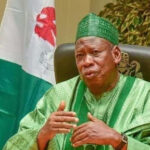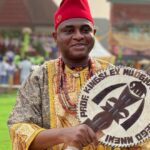By early evening yesterday, the Chief Returning Officer of last Saturday’s presidential election, INEC Chairman Professor Mahmood Yakubu, had collated the results of only six states and the FCT at the International Conference Centre in Abuja. Yet, results already collated at various levels have created many upsets and many surprises. Chances are that many more surprises lie in store for politicians and for Nigerians before the 2019 election circle is over.
There were relatively few surprises in the presidential election. As expected, APC’s candidate President Muhammadu Buhari is doing very well in the North West, where he is expected to win all seven states. He is doing well in the North East, where he is also expected to win most of the states. He however lost in Adamawa while Taraba was still awaited. Buhari is also doing fairly well in the North Central states, having triumphed in Kwara, Nasarawa and Kogi States. He is however not doing well in the South East and South South states, including Imo and Edo States which are APC controlled. In the South West, APC’s candidate recorded wins in Ekiti, Osun, Ogun and Lagos but was defeated in Ondo and Oyo. APC’s win in Lagos was also thin, quite likely due to the upheaval that upstaged Governor Akinwunmi Ambode from its ticket.
His main rival, PDP candidate Atiku Abubakar, is doing very well in the South East and South South. He is likely to win all the states in those two regions with the possible exception of Edo. Atiku has managed to snatch two important Yoruba states under the noses of APC governors, namely Ondo and Oyo, and he had a very good run in Lagos. PDP’s candidate is doing well in the North Central states of Plateau and Benue. He also garnered more votes than expected in Kano State, which observers attribute to the Kwankwasiyya factor. Atiku also managed last night to win his home state of Adamawa. The neighbouring PDP-controlled Taraba was also in his sights.
Most of the surprises however emerged from the National Assembly election, which took place at the same time. The biggest shocker was the defeat of Senate President Bukola Saraki in Kwara. In fact, APC swept all the National Assembly seats in the state, thus bringing to an abrupt end the five-decades-old Saraki political mystique in the state. House Speaker Yakubu Dogara however defied all odds and secured re-election in his constituency in Bauchi State, which is an ethnic minority area.
In Borno State, outgoing governor Kashim Shettima was heading to a landslide win in his Borno Central constituency last night. His counterparts in Imo and Ogun, Rochas Okorocha and Ibikunle Amosun, were also said to be coasting home to victory. Nasarawa State Governor Umaru Tanko Al-Makura was elected to Senate from Nasarawa South. His predecessor in office, Abdullahi Adamu, was also re-elected from Nasarawa West. Former Gombe State Governor Mohammed Danjuma Goje also won re-election from Gombe Central. One of the most interesting senatorial wins was recorded in Sokoto last night, when APC’s former state governor Aliyu Magatakarda Wamakko was re-elected from Sokoto Central. It climaxed a tough battle with his former protégé, Governor Aminu Waziri Tambuwal who defected to PDP last year. In Zamfara State, APC’s Governor Abdulaziz Yari Abubakar, who entered the race at the last minute due to legal tussles, was elected to Senate from Zamfara West last night.
However, their colleague Governor Abiola Ajimobi of Oyo went down to defeat in the senatorial election, as did his Gombe State counterpart Ibrahim Hassan Dankwambo. While Ajimobi contested under APC’s platform, Dankwambo contested under PDP’s; he had earlier failed to secure PDP’s presidential ticket at the Port Harcourt convention. Former Abia State governor Orji Uzor Kalu, who contested under APC, was elected in Abia North but his party mate, former Akwa Ibom State governor Godswill Akpabio, who made a big splash with his defection from PDP to APC last year, reportedly lost the election last night.
In one of the greatest puzzles of Nigerian politics, Senator Dino Melaye was re-elected to the Senate on PDP’s platform from Kogi West. He defeated APC’s candidate Smart Adeyemi. As it is, the two men had clashed for the same seat in 2015 but while Dino was then APC’s candidate, Adeyemi was then PDP’s candidate! In neighbouring Benue State, controversial former Interior Minister Abba Moro was elected from Benue South to occupy the seat being vacated by his political godfather, former Senate President David Mark. This was the first Senate election since 1999 that David Mark did not contest [and win].
The mother of all unlikely victories was recorded in Anambra South where the billionaire owner of Capital Oil, Ifeanyi Uba, was elected to the Senate on the platform of the little known Young Progressive Party, YPP. He defeated two brothers, PDP candidate Chris Ubah and APC’s Andy Ubah, who governed the state for two weeks in 2007. APGA, which governs Anambra, did a very poor showing in the election. YPP’s presidential candidate is the former CBN deputy governor Kingsley Moghalu.
One of the outgoing Senate’s most visible members, Senator Shehu Sani of Kaduna Central, who contested on PRP’s platform, lost to APC candidate Uba Sani, Political Adviser to Governor Nasiru El-Rufa’i. Sani and El-Rufa’i have been bitter enemies despite both belonging to the same party. APC’s national chairman Adams Oshiomhole had tried and failed to grant Shehu Sani an automatic return ticket, so the senator subsequently defected to PRP. Dozens of other senatorial results were still being awaited from all over the country last night. Among the most highly anticipated was one from Kano Central, where former state governor and former Education Minister Malam Ibrahim Shekarau was contesting on APC’s platform.
A close study of many of the declared results showed that, in areas swept by APC, there were discrepancies, sometimes wide ones, between the votes scored by President Buhari and the votes garnered by the party’s senatorial and House of Reps candidates. Many APC senatorial and House candidates scored fewer votes than Buhari did. Clearly, local factors came into play in many areas and affected the voting pattern. This might yet turn out to be the most important development in this election, the ability of voters to vote for candidates, not parties. This is a warning to political parties in future to conduct their primaries more democratically and to shun candidate imposition.
What do the results of last Saturday’s election portend for the governorship and state assembly elections coming up at the end of next week? The simple answer is, no one knows because voters now have a mind of their own.

 Join Daily Trust WhatsApp Community For Quick Access To News and Happenings Around You.
Join Daily Trust WhatsApp Community For Quick Access To News and Happenings Around You.


